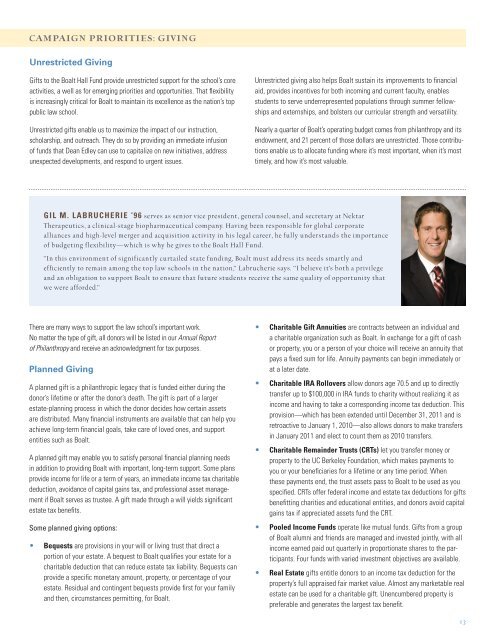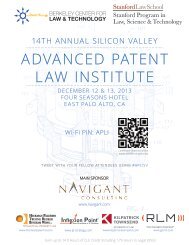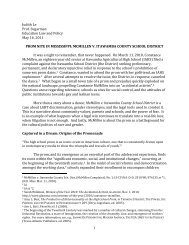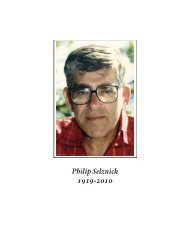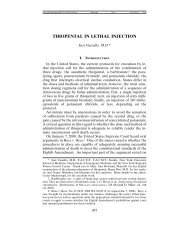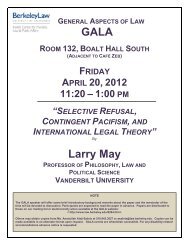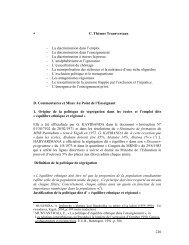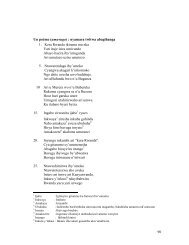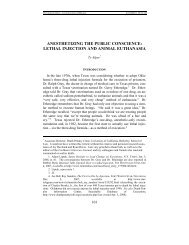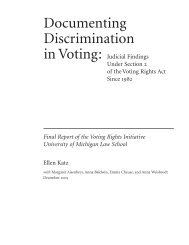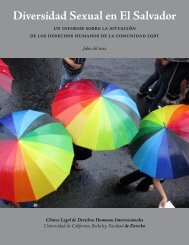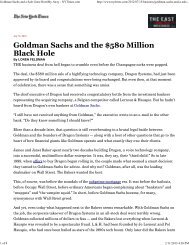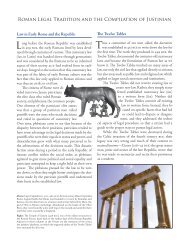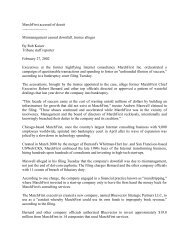PHILANTHROPY - Berkeley Law - University of California, Berkeley
PHILANTHROPY - Berkeley Law - University of California, Berkeley
PHILANTHROPY - Berkeley Law - University of California, Berkeley
Create successful ePaper yourself
Turn your PDF publications into a flip-book with our unique Google optimized e-Paper software.
CAMPAIGN PRIORITIES: GIVING<br />
Unrestricted Giving<br />
Gifts to the Boalt Hall Fund provide unrestricted support for the school’s core<br />
activities, a well as for emerging priorities and opportunities. That flexibility<br />
is increasingly critical for Boalt to maintain its excellence as the nation’s top<br />
public law school.<br />
Unrestricted gifts enable us to maximize the impact <strong>of</strong> our instruction,<br />
scholarship, and outreach. They do so by providing an immediate infusion<br />
<strong>of</strong> funds that Dean Edley can use to capitalize on new initiatives, address<br />
unexpected developments, and respond to urgent issues.<br />
GIL M. LABRUCHERIE ‘96 serves as senior vice president, general counsel, and secretary at Nektar<br />
Therapeutics, a clinical-stage biopharmaceutical company. Having been responsible for global corporate<br />
alliances and high-level merger and acquisition activity in his legal career, he fully understands the importance<br />
<strong>of</strong> budgeting flexibility—which is why he gives to the Boalt Hall Fund.<br />
“In this environment <strong>of</strong> significantly curtailed state funding, Boalt must address its needs smartly and<br />
efficiently to remain among the top law schools in the nation,” Labrucherie says. “I believe it’s both a privilege<br />
and an obligation to support Boalt to ensure that future students receive the same quality <strong>of</strong> opportunity that<br />
we were afforded.”<br />
There are many ways to support the law school’s important work.<br />
No matter the type <strong>of</strong> gift, all donors will be listed in our Annual Report<br />
<strong>of</strong> Philanthropy and receive an acknowledgment for tax purposes.<br />
Planned Giving<br />
A planned gift is a philanthropic legacy that is funded either during the<br />
donor’s lifetime or after the donor’s death. The gift is part <strong>of</strong> a larger<br />
estate-planning process in which the donor decides how certain assets<br />
are distributed. Many financial instruments are available that can help you<br />
achieve long-term financial goals, take care <strong>of</strong> loved ones, and support<br />
entities such as Boalt.<br />
A planned gift may enable you to satisfy personal financial planning needs<br />
in addition to providing Boalt with important, long-term support. Some plans<br />
provide income for life or a term <strong>of</strong> years, an immediate income tax charitable<br />
deduction, avoidance <strong>of</strong> capital gains tax, and pr<strong>of</strong>essional asset management<br />
if Boalt serves as trustee. A gift made through a will yields significant<br />
estate tax benefits.<br />
Some planned giving options:<br />
• Bequests are provisions in your will or living trust that direct a<br />
portion <strong>of</strong> your estate. A bequest to Boalt qualifies your estate for a<br />
charitable deduction that can reduce estate tax liability. Bequests can<br />
provide a specific monetary amount, property, or percentage <strong>of</strong> your<br />
estate. Residual and contingent bequests provide first for your family<br />
and then, circumstances permitting, for Boalt.<br />
Unrestricted giving also helps Boalt sustain its improvements to financial<br />
aid, provides incentives for both incoming and current faculty, enables<br />
students to serve underrepresented populations through summer fellowships<br />
and externships, and bolsters our curricular strength and versatility.<br />
Nearly a quarter <strong>of</strong> Boalt’s operating budget comes from philanthropy and its<br />
endowment, and 21 percent <strong>of</strong> those dollars are unrestricted. Those contributions<br />
enable us to allocate funding where it’s most important, when it’s most<br />
timely, and how it’s most valuable.<br />
• Charitable Gift Annuities are contracts between an individual and<br />
a charitable organization such as Boalt. In exchange for a gift <strong>of</strong> cash<br />
or property, you or a person <strong>of</strong> your choice will receive an annuity that<br />
pays a fixed sum for life. Annuity payments can begin immediately or<br />
at a later date.<br />
• Charitable IRA Rollovers allow donors age 70.5 and up to directly<br />
transfer up to $100,000 in IRA funds to charity without realizing it as<br />
income and having to take a corresponding income tax deduction. This<br />
provision—which has been extended until December 31, 2011 and is<br />
retroactive to January 1, 2010—also allows donors to make transfers<br />
in January 2011 and elect to count them as 2010 transfers.<br />
• Charitable Remainder Trusts (CRTs) let you transfer money or<br />
property to the UC <strong>Berkeley</strong> Foundation, which makes payments to<br />
you or your beneficiaries for a lifetime or any time period. When<br />
these payments end, the trust assets pass to Boalt to be used as you<br />
specified. CRTs <strong>of</strong>fer federal income and estate tax deductions for gifts<br />
benefitting charities and educational entities, and donors avoid capital<br />
gains tax if appreciated assets fund the CRT.<br />
• Pooled Income Funds operate like mutual funds. Gifts from a group<br />
<strong>of</strong> Boalt alumni and friends are managed and invested jointly, with all<br />
income earned paid out quarterly in proportionate shares to the participants.<br />
Four funds with varied investment objectives are available.<br />
• Real Estate gifts entitle donors to an income tax deduction for the<br />
property’s full appraised fair market value. Almost any marketable real<br />
estate can be used for a charitable gift. Unencumbered property is<br />
preferable and generates the largest tax benefit.<br />
13


